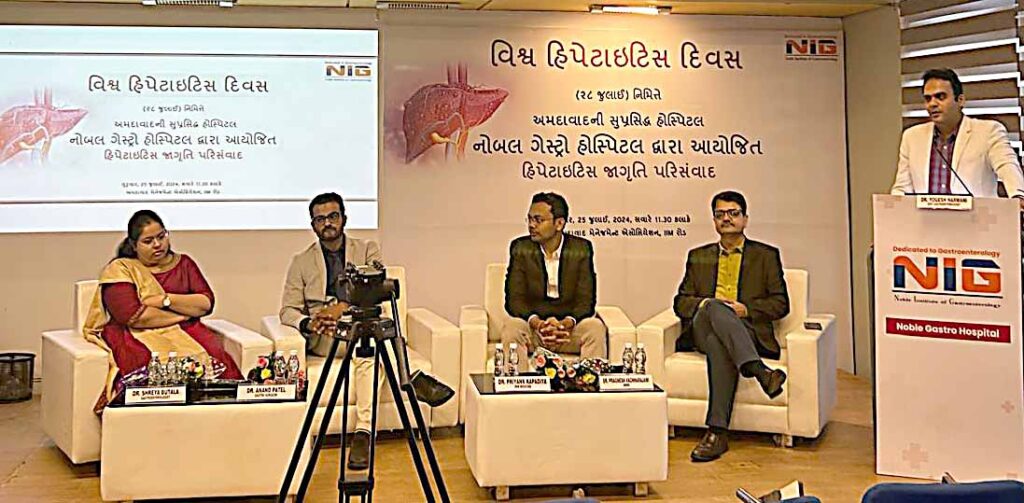Noble Gastro Hospital hosted a panel discussion on World Hepatitis Day

- Gujarat ranks 6th in India for Hepatitis B prevalence, following states like Telengana and Andhra Pradesh
A significant portion of the population in Gujarat may be living with chronic Hepatitis B, often unaware of their condition
Only 25% of males and 18.9% of females nationally are fully vaccinated for Hepatitis B, posing a significant risk for majority of population
Ahmedabad, Gujarat – July 25, 2024: Noble Gastro Hospital, a state-of-the-art centre for single specialty Gastroenterology in Ahmedabad, organized a comprehensive panel discussion in recognition of World Hepatitis Day (observed on 28th July every year across the world) at Ahmedabad Management Association, Ahmedabad. The event, held on July 25, brought together esteemed medical professionals to discuss the prevalence of Hepatitis in Gujarat, its treatment options, and the critical need to raise awareness about the disease.
During the panel discussion, experts highlighted the seroprevalence rates of Hepatitis B and C in Gujarat, noting that the state has a higher seroprevalence compared to national averages. Nationally, the seroprevalence of Hepatitis B is 0.95%, while in Gujarat, it is 1.2%. For Hepatitis C, the national seroprevalence is 0.32%, with Gujarat reporting a rate of 0.19%. Gujarat ranks 6th in India for Hepatitis B seroprevalence, following states like Telangana and Andhra Pradesh. A significant portion of the population may be living with chronic Hepatitis B, often unaware of their condition.
Dr. Yogesh Harwani, Gastroenterologist, Noble Gastro Hospital emphasized, “These figures indicate the pressing need for targeted healthcare strategies and increased public health initiatives in Gujarat to manage and prevent Hepatitis. Early detection and lifestyle modifications can significantly improve outcomes for patients with co-morbid conditions.”
The discussion also delved into the age demographics most affected by Hepatitis. It was noted that while Hepatitis B and C can occur at any age, their prevalence increases with advancing age. Dr. Shreya Butala, Gastroenterologist, Noble Gastro Hospital stated, “Early screening and preventive measures are crucial, especially for older adults, to mitigate the risks associated with Hepatitis.”
Addressing the severity of the disease, panellists explained that any cause of Hepatitis -whether viral, medication-induced, or alcohol-related – can be life-threatening. High INR levels (a test for liver function) or altered sensorium are significant indicators of severe Hepatitis. Dr. Anand Patel, a Gastro Surgeon, remarked, “Prompt medical intervention is essential in cases of severe Hepatitis to prevent fatal outcomes.”
The panel underscored the importance of vaccination, noting that only 25% of male subjects and 18.9% of female subjects nationally are fully vaccinated for Hepatitis B. Those unvaccinated and infected face significant risks, including a 10-20% chance of developing cirrhosis and a 5% chance of progressing to liver cancer. Dr. Priyank Kapadia, MD (Medicine) highlighted, “Increasing vaccination rates is a critical step in reducing the burden of Hepatitis. Educating the public and increasing awareness about Hepatitis is crucial to encouraging testing and vaccination.”
Gender differences in Hepatitis prevalence were also discussed, with data showing higher seroprevalence among men than women for both Hepatitis B and C. “Understanding these disparities is vital for developing effective public health policies and vaccination campaigns” added Dr. Pragnesh Vachharajani, an MBBS doctor.
Mortality data for Hepatitis in Gujarat is limited, but the panel shared approximate figures based on clinical experience, emphasizing the disease’s severe impact. They also discussed the link between Hepatitis and other conditions such as obesity, diabetes, and alcohol intake, noting that Hepatitis due to fatty liver is common in these populations.
The risks associated with unsafe tattooing practices were also highlighted, with the use of the same needle for multiple clients leading to Hepatitis B & C infections. The prevalence rate of Hepatitis B among tattooed donors is about 3.3%. “Safe tattooing practices and strict sterilization protocols are essential to prevent spread of Hepatitis”, added Dr. Yogesh Harwani.
Reflecting on the deadly Hepatitis outbreak in 2009 in Modasa taluka, Sabarkantha district, where 125 patients were acutely infected, and 49 died, the panel emphasized the importance of using disposable syringes and maintaining proper sterilization standards. Dr. Shreya Butala concluded, “This tragic event underscores the need for strict safety protocols in medical practices to prevent future outbreaks.”




